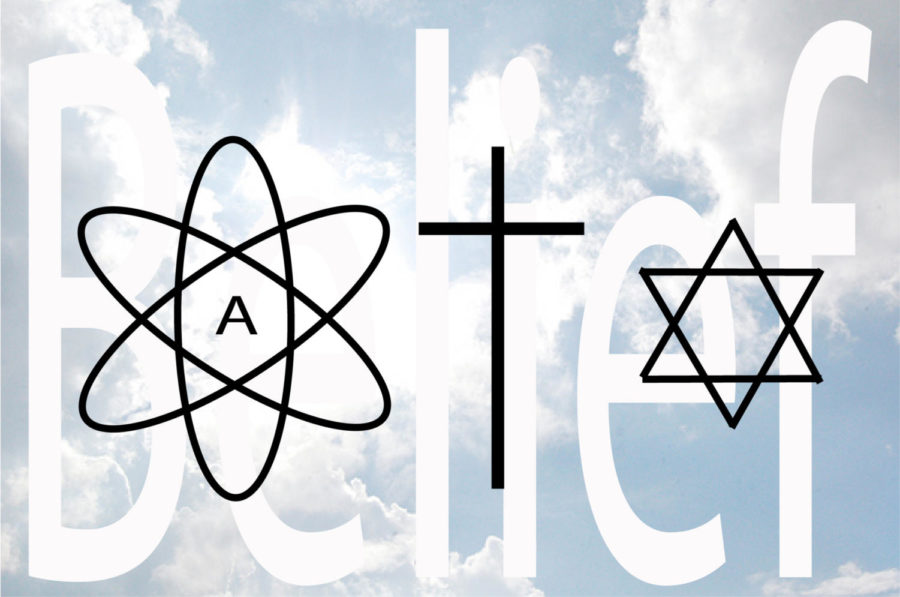Brown: Atheism and theism are both beliefs
Leah Stasieluk/Iowa State Daily
Billions of individuals have found peace in their relationship with a god or gods they believe in, while many others have been equally happy to go through life with a belief that no divine or spiritual realms exist whatsoever.
September 18, 2013
Does God exist?
Theists believe yes. Atheists believe no. Neither side, no matter how much they may pretend otherwise, has an answer based in objective facts. The only objectively defensible position in this line of divine questions is that of an agnostic, who thinks that we cannot actually know for sure one way or the other.
That is not to say that no one should hold atheist or theist beliefs. Agnostics can be atheists or theists. The only defining characteristic is that they think neither belief system has an objective superiority.
Furthermore, there is absolutely nothing wrong with having beliefs that cannot be proven, so long as they do not harm others. Likewise, there is nothing wrong with devoting the entirety of one’s life to a belief.
Billions of individuals have found peace in their relationship with a god or gods they believe in, while many others have been equally happy to go through life with a belief that no divine or spiritual realms exist whatsoever. What these two totally different views have in common is that they are, in fact, beliefs.
Beliefs are ideas we think to be true, even without factual evidence. “Factual evidence” refers to objective realities that can be observed as identical by distinct individuals. For instance, if there are three red balls sitting in the middle of a room, anyone who looks into the room, provided they have the ability to see color, will be able to tell you that there are three balls in the room and that they are red.
Things that are not factual evidence are often invoked as if they are anyway. One example of this that atheists are commonly guilty of is saying something along the lines of: “If God is real, may he strike me down with lightning right now!” and then acting as if God is fictitious purely because they aren’t stricken where they stand.
That is not evidence; it is a useless gesture that self-righteous morons exclaim to make themselves feel intellectually superior. If a divine presence existed, it or they would not be beholden to the suggestions or commands of some random person.
A second bit of common “evidence” is a reference to all of the world religions now seen as pure mythology. An ancient Greek would likely defend their pantheon of gods with the same tenacity that a Christian would defend the stories of the Bible, but this does not mean both must be wrong.
Unfortunately for an atheist using this tactic, pointing out dead religions only weakens the claim that the exact tenants of a faith should be believed as fact, not the underlying belief in something supernatural.
On the theist side, an often seen piece of “evidence” is an allusion to the notion that “science doesn’t have all the answers,” (such as what existed before the Big Bang) and therefore God exists in all of his (or her or its or their) splendor.
This nonargument is also distinctly lacking evidence, since the observation that some questions are not yet scientifically answered does not support any single unscientific explanation. It should also be noted that this “evidence” for the existence of something divine confuses science with atheism, two completely different concepts.
More so-called evidence for the existence of mystical forces is a “feeling” religiously inclined individuals have. They claim to literally feel the presence of their god or gods, or that they “just know” God exists, thereby providing proof of whatever supernatural ideas they believe in.
Such assertions are not a claim of evidence so much as they are simply a very stern claim. Someone’s alleged extrasensory perception is not in itself proof. If it were, psychics and magicians the world over would be making a lot more money.
Rather than try to even provide evidence of their own, some atheists and theists may claim that the burden of proof rests with their opponents. As it turns out, the burden of proof lies with anyone who is asserting that their claim should be believed by others, whether they see themselves as spreading the Word of God or spreading logic and reason.
Neither atheism nor theism is the default settings for humans. The dispositions and opinions of those who raise a child will always seep into that child’s belief structure.
Both atheists and theists can believe whatever they want. That is the nature of belief. However, if they want to go around saying that “the evidence” supports their view, they need to actually provide some evidence.

















